The people have spoken, and they say that in most of Portland, it’s getting harder to park a car on the street:
Since the central-city building boom resumed, residents of every part of the city except East Portland are more likely to say it’s annoying to find a car parking space.
But this is interesting: they say something else, too.
Since the central-city building boom resumed, residents of every part of the city except East Portland are more likely to say they’re highly satisfied with their neighborhoods.
Advertisement
These are just a couple sets of numbers in the massive annual community survey out today from the Portland auditor’s office, and take them with a grain of salt: all of these changes are within the margins of error. (It’s ±4-5 percentage points for neighborhoods, ±1.7 percentage points citywide.)
In any case, as Portland begins a year-long process of trying to find long-term solutions to its street parking situation, it’s pretty clear that open street parking spaces have been getting scarcer. But to the extent that these figures are true, this would be exactly the outcome city planning officials say they’re shooting for: neighborhoods that are getting more crowded because they’re getting, on balance, more awesome.



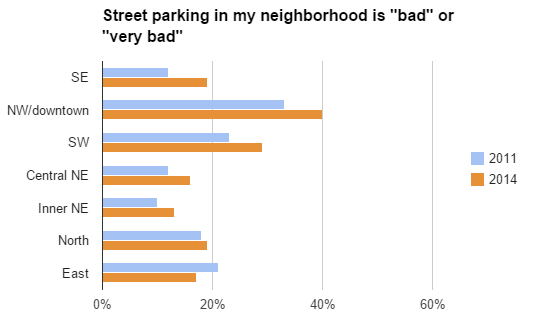
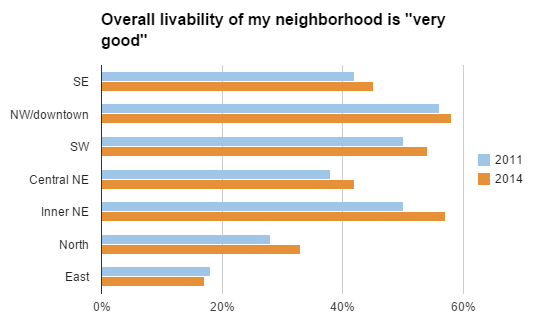
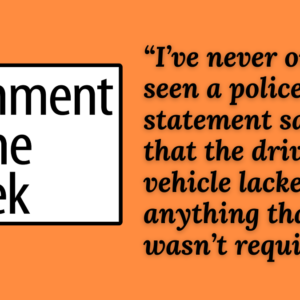
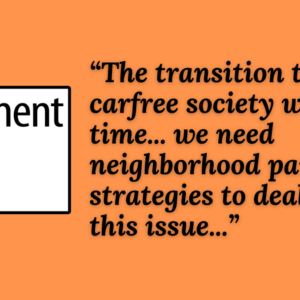
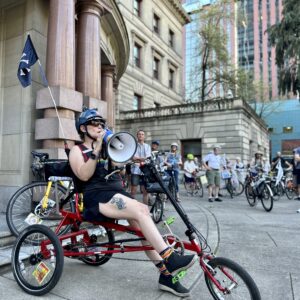

Thanks for reading.
BikePortland has served this community with independent community journalism since 2005. We rely on subscriptions from readers like you to survive. Your financial support is vital in keeping this valuable resource alive and well.
Please subscribe today to strengthen and expand our work.
Difficult-to-find street parking is obviously the root cause of increased livability. I therefore propose a neighborhood revitalization program centered on making parking more difficult. Who’s with me? Street seats everywhere! Remove parking for cycletracks!
Seems you could argue that the desire for more parking implies encouraging, as in spending more money on, bike facilities. Though it may be akin to widening roads to reduce congestion.
Thanks for pointing out the margin of error…as I was thinking the same thing…too close for much use on the delta of the parking question.
As for larger trends between these two questions: improved livability = parking scarcity (or free parking does not always make life better)
I support the premise but you are saying there is no meaningful difference in the data…but we will go ahead and post a blog to interpret the difference anyway? That is no better interpretation of stats than the Oregonian.
The fact that the results are within the margin of error doesn’t make them meaningless. Every margin of error is a little bell curve, with the highest probability right around the numbers reported here. When every single one of those bell curves shifts in the same direction (as in all the various neighborhoods above except for East Portland, which isn’t densifying much right now except in the Gateway area) that’s a pretty clear sign of a trend, inside the margin or no. That’s why we thought this was worth reporting.
Agreed. Since this is an annual survey, shouldn’t there be visible trends in the data that one could consider more reliable that comparing one year to the next? Was this question asked before last year?
It’s asked every year; I picked 2011 for the comparison because that was when the building boom started up again and no-parking apartments started to become a significant political issue.
It does make me wonder what people consider “bad” or “very bad” for parking. If only these options were enumerated: Very Good (I always can park in front of my residents), Good (I can always park within 150′ of my house), neutral (I can always park on my block face), Bad (I often have to park around a corner or more a block away), Very Bad (I often have to park more than a block away).
Much better phrasing, and more telling. I like your suggestion.
“it’s pretty clear that street parking spaces have been getting scarcer”
But has it actually?
I think complaining to surveys about how bad finding a parking spot for your car is is reflexive, like saying ‘oh isn’t she cute’ when your neighbor who just had a daughter comes outside with her the first time. People say this not because she is (necessarily) actually cute, but because this is expected. It doesn’t mean anything.
Seems like a reasonable theory to me. My own hunch is that people who own cars are pretty good at detecting the street parking situation when they make the big decision to move into a neighborhood. Naturally their preference is for the situation to remain exactly as it was when they did so. When you move to a new neighborhood, your expectations reset.
So I think “bad” just means “more annoying than I remember it being.”
And we all know what great memories humans tend to have…..
I agree that car owners are good at detecting the parking situation and changes therein—if we leave out the politics: the conversations they find themselves in, the fact that we all need something to gripe about, and that traffic, parking, the weather, etc. are perennial favorites when it comes to complaining about something, anything.
Sell your car! If you must have a car, buy or rent a place that has on-property parking. The problem is that surveys like this will make it even harder to convince the City to remove on-street parking in order to create bicycling facilities. Already, it is nearly impossible to remove parking. This survey will only make it worse.
Both SF and Seattle are carpeted with permitted parking.
What is it about Portland that makes people so obsessed with free parking? Are portlanders really more conservative than these two cities when it comes to parking?
Portland is only recently becoming a city, and only now discussing permit parking.
Really, there are very few places in Portland where street parking is limited, outside of Downtown. People are used to being able to parking right in front of their house, instead of in their garage or driveway!
Shorter version: We want the charm of a 1920s neighborhood, but with 2010’s suburban parking.
It may be even worse than that. The cars are their own. Multnomah Co. homeowners have, on average, more cars per person and more cars per household than do renters. It is fun to blame renters, developers, density, city gov’t, or whoever for this but, really, if you don’t have a car you hardly notice it.
Complaining about the very thing the complainer is making worse through his own choices and behaviors is to me the most loathsome kind of utterance.
…and often there are more cars than voters in most cities…like Portland etc.
Street parking is “scarce,” because it is free. Free parking incentivizes people to park on the street (and own cars if they don’t need them). Let’s add permit parking to more neighborhoods close-in. People will pay, or they won’t. Maybe they will even use their driveways and garages or realize that they do not own the parking space on the curb out front of their house. People in Portland claim “scarcity” if they have to sometimes park just down the street from their homes. Portland is a city. When people live in a city, there are trade-offs. If you are in a close-in neighborhood, there are cool things to do. You might get cool things to do with the sacrifice of parking right in front of your own house every day.
I doubt that many people who don’t need a car are convinced to get one just because they would have free parking.
Salviati: Most prime numbers are odd.
Simplicio: Two is even! Your argument completely falls apart!
Fine, I am being a little uncharitable. Incentives always work at the margins. They change the decisions of people who are on the fence. In fact, incentives are effective *despite* the fact that they work only at the margins. A person who quits smoking because tobacco taxes are too high still reduced the total number of smokers, regardless of whether most smokers are making the same decision.
I know in my neighborhood neighbors KNOW that permit parking, with street metering coming….the question just is when. To be honest, many residents would prefer it but we just do not have enough congestion….yet….to make it viable. Give it five more years of development. I have to point out though, for those neighbors in the past that have complained when I ask them, “It is it that parking is THAT limited in your immediate area or is it just that you can not park directly in front of your house?
The issue is that people just can not park …..all of the time…..in front of their house. There are always spots a block or so away.
“The people have spoken, and they say that in most of Portland, it’s getting harder to park a car on the street:” But the data supporting this change are statistically weak, and show that only one in five say that street parking is a significant problem. Hardly a mandate for change. Sounds more like an invitation for more rants about storing private property in the common space.
It bugs me whenever I see the arguments about “using common space to store private property”. Cars are private property and so are bikes. They are apples and oranges in many respects, but they are both private property. Why is it okay (even desired) to let people store bicycles, but not cars, in the public right-of-way? I just want to know what the principle is.
the difference is how much less space a bicycle takes up compared to a car.
So you’re allowed to store your property in a public place unless it’s too big? Who determines what is too big?
To put it another way, it’s okay for my goat to graze in the common, but you can’t graze your cow there. Makes no sense. It’s common space with collective rights for use.
Since you invoked the commons, I’ll disagree with your statement. A commons, by definition, has a carrying capacity. It may well be that our asphalt commons can accommodate all the bike parking we could hope to need. We know, though, that it cannot accommodate even today’s demands for free car parking at all times and still accommodate the other uses to which we’d like to put parts of it. Carrying capacity is an important part of this discussion. I think when it comes to onstreet parking the ratio is something like 11:1. By switching to bikes (goats) we are able to instantly increase the carrying capacity of our parking (grazing) infrastructure by a factor of 11. That is hardly trivial.
I think our concrete commons are way below carrying capacity in most of the city, most of the time. Certainly there are exceptions.
I don’t know if it is more how big something as opposed to how long when comparing bikes to cars. There are definitely more cars being stored overnight (or even long term, days and weeks) on the road than bikes. People rarely want to leave their bike locked up with risk of theft and exposure to the elements.
“I just want to know what the principle is.”
A reasonable request.
I don’t think it is about the relative size. My take is that the automobile as a system enjoys countless subsidies (interstate highway system, free onstreet parking, subsidized gas prices, preferential treatment by law enforcement and the courts in the case of crashes, etc.). No such subsidies adhere to the bicycle even though the bicycle does not generate any of the negative social and environmental and economic consequences the car does. As such, getting one of the perks (free onstreet parking) that the car has enjoyed for nearly a century seems like a modest attempt to tilt the scales back a little.
This isn’t so much a principle as a rebalancing effort. Put another way, if we got rid of *all* the subsidies to the car, then we could/should revisit this free onstreet bike parking thing.
Thanks for your comment. I definitely agree that the “car is king” mentality is far too entrenched. I suppose we have to aim for small victories wherever we can find them.
Thinking of this another way. Just this week we’ve seen articles here on bikeportland that
(a) mentioned making Trimet free (to encourage bus use), and
(b) started tolling highways or bridges (to presumably discourage discretionary auto use).
Viewed from a mode neutral angle this too might seem unfair, but I’d argue that it isn’t; rather it represents attempts to re-balance our system such that accessibility is improved for the greatest number. As Ivan Illich put it forty years ago,
“People on their feet are more or less equal. People solely dependent on their feet move on the spur of the moment, at three to four miles per hour, in any direction and to any place from which they are not legally or physically barred. An improvement on this native degree of mobility by new transport technology should be expected to safeguard these values and to add some new ones, such as greater range, time economies, comfort, or more opportunities for the disabled. So far this is not what has happened. Instead, the growth of the transportation industry has everywhere had the reverse effect. From the moment its machines could put more than a certain horsepower behind any one passenger, this industry has reduced equality, restricted mobility to a system of industrially defined routes, and created time scarcity of unprecedented severity. As the speed of their vehicles crosses a threshold, citizens become transportation consumers…”
http://ranprieur.com/readings/illichcars.html
glad to see that the majority of people still think that parking is good or very good… except downtown…
Good point.
One more vote for parking permits. Then the Portland Driveway Preservationists may 1) start using their own drives and garages for their myriad vehicles, 2) hate it (‘the clutter!’), and 3) finally get rid of a few (dozen). I really hate how people use the street for their car/motor home/boat/truck/beater collections.
The overall livability in my neighborhood has increased over the last 3 years too, but it has nothing to do with parking. It mostly has to do with the increased cost of housing. Bad elements are getting pushed (priced) further out of town.
That being said, hearing the traffic idling on the streets from loss of lanes is not so pleasant. Trying to get out of my neighborhood during certain times f day has certainly become more difficult. And since the loss of lane on Burnside, I have noticed a significant increase in cut-through traffic.